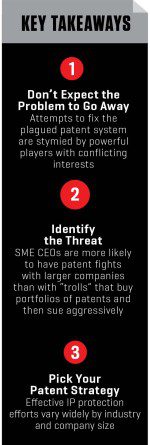Arguably the most innovative sector of the American economy is small and medium-sized companies, not multinational giants. But the innovative spirit and capability of SMB companies is being hampered by the U.S. patent mess. This is what America should really be talking about.
How Small and Mid-Market Firms Can Navigate Patent Purgatory
CEOs of small and medium-sized companies face very different challenges than Apple and Samsung do.
Timothy Kane, the CEO of an industrial heating and ventilation company, worries about it. So does Scott DeFelice, who heads a three-dimensional printing company that makes everything from artificial pieces of the human cranium to satellite parts. Plus, it’s a problem that almost wiped out San Francisco software entrepreneur Jason Bannert.
The issue is patents, and it bedevils CEOs of small and medium-sized companies across the U.S. in a wide variety of industries, even sectors such as heating and ventilation that wouldn’t appear at first glance to be technology-based. Battles between Apple and Samsung Electronics dominate the headlines, but they are just the tip of the proverbial iceberg.
without permission by a bigger company than it is to be sued itself for patent infringement by a troll.”
 The U.S. patent system was designed to encourage entrepreneurs of all shapes and sizes to innovate by assuring them the opportunity to make money from their inventions for a set period of time. But the system has broken down in many crucial respects. The U.S. Patent and Trademark Office can take up to five years to grant a patent, rendering it useless in the marketplace, or it can grant a patent to a company whose product is not really novel or not very clear, setting the stage for almost certain litigation. Large companies can “borrow” technology from smaller companies and hide behind a wall of expensive litigation for years. And of course, the famous patent trolls, located mostly in East Texas, attack mostly large companies, claiming they violated patents acquired by the highly litigious Texans.
The U.S. patent system was designed to encourage entrepreneurs of all shapes and sizes to innovate by assuring them the opportunity to make money from their inventions for a set period of time. But the system has broken down in many crucial respects. The U.S. Patent and Trademark Office can take up to five years to grant a patent, rendering it useless in the marketplace, or it can grant a patent to a company whose product is not really novel or not very clear, setting the stage for almost certain litigation. Large companies can “borrow” technology from smaller companies and hide behind a wall of expensive litigation for years. And of course, the famous patent trolls, located mostly in East Texas, attack mostly large companies, claiming they violated patents acquired by the highly litigious Texans.
Legislation that might have addressed the patent mess was not able to get through Congress in 2015 and is almost certainly dead until after the November 2016 elections. Big interest groups such as the pharmaceutical industry and the trial lawyers who benefit from litigation helped tie up the bills.
Ironically, the absence of new legislation might actually be good for smaller companies. The intent was to make it harder for trolls to sue companies because they would have to pay all legal costs if they lost a suit.
But the legislation might have made matters worse for smaller companies in bringing action against a large company that stole their technology, because if they failed to prevail in court, they would be responsible for all legal costs. That would have given large companies virtually free rein to exploit smaller companies’ technologies. “A smaller business is more likely to have its technology used without permission by a bigger company than it is to be sued itself for patent infringement” by a troll, says Jonathan Ellenthal, vice chairman and CEO of HaystackIQ, which helps companies search the federal database of patents and similar databases around the world.
Thus, CEOs of smaller companies, many of whom cannot afford in-house legal departments, are caught in the crossfire and find themselves largely on their own in this modern-day version of Dante’s patent hell.
“It takes a tremendous amount of time and money and human resources to go through these fights,” says Kane, whose Goodway Technologies, based in Stamford, Connecticut, has sales of more than $30 million in 125 countries. “That’s part of day-to-day life for anybody who’s involved with patents.”
(GO TO www.chiefexecutive.net for the full story)



